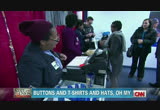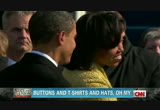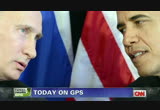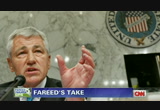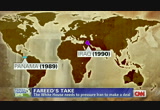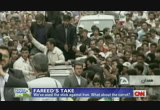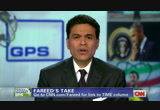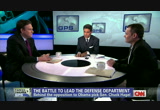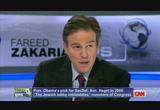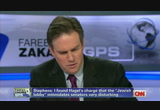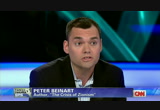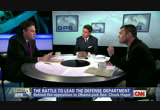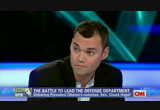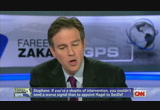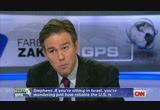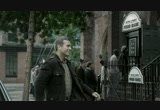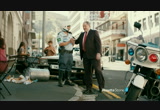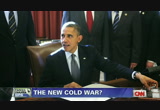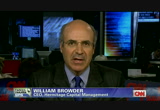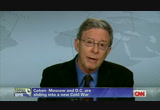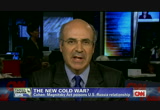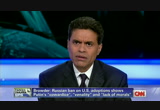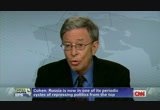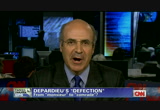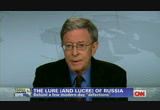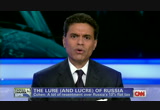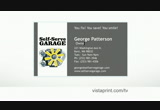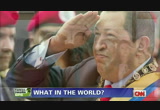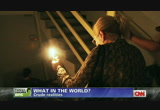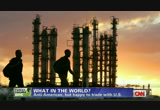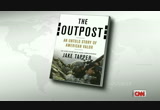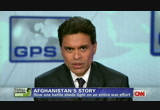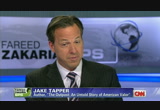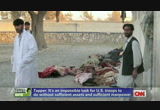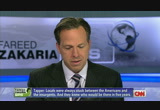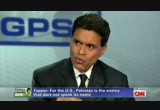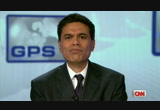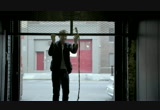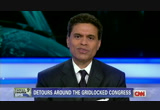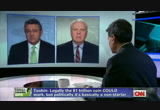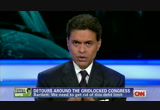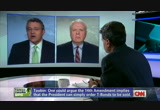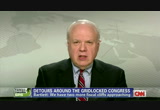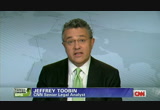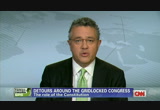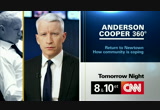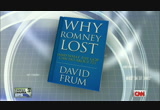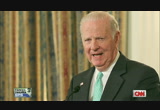tv Fareed Zakaria GPS CNN January 13, 2013 10:00am-11:00am PST
10:00 am
president, the official inauguration pop-up store opened for business this week. because what's an inauguration without t-shirts, teddy bears and hat s and tube socks. not just any tube socks, mind you. official tube socks. obama supporters can also pick up a medallion coin set for $7,500. >> a small piece of history that you can keep. >> for the budget conscious inauguration reveler. >> buttons. people are buying buttons. >> my merchandise, my buttons. >> everybody wants these buttons today. >> for just $2.50 a pop. barack buttons, biden buttons and if you're doing it up big, bo buttons. >> i think my favorite one has to be this one. it's the old one from the first family. i like this one. >> congratulations, mr. president. >> fewer people are expected for the second obama inaugural than the million plus who showed up for fths irs and fewer activities as well, but a die-hard obama fan with
10:01 am
the right hat can party anywhere she wants. thanks for watching "state of the union." i'm candy crowley in washington. head to cnn.com/sotu for extras and analysis. if you missed any part of today's show find us on itunes, just search state of the union. fareed zakaria gps is next. this is "gps" the global public square. welcome to all of you in the united states and around the world. i'm fareed zakaria. we v a series of feisty debates on the hot topics of the day. we start with president obama's nomination of senator chuck hagel to be the next secretary of defense. we have a clash you will want to watch. then the relationship between the united states and russia keeps getting worse, whose fault is it? moscow or washington? a debate. also, the next fight in washington will be over the debt ceiling. can president obama end this craziness and bypass congress altogether?
10:02 am
we'll talk about the out of the box solutions and whether they would work. and, finally, this is the signature of the man who might be the next treasury secretary. we'll look back through history to see if there's any loopy president. speaking of secretaries of the treasury three former holders of the office and many other statesmen and women offering advice to the president on a new gps special tonight "memo to the president, road map for a second term." tonight at 8:00 p.m. and 11:00 p.m. eastern and pacific. first, here's my take. chuck hagel's nomination as america's next secretary of defense has drawn fire from people who say he's outside of the main stream. in fact, he's a pretty straight forward, traditional republican on most issues with a reluctance to go to war, born of knowledge and experience. where hagel does appear out of the mainstream in washington's world of group think is on iran.
10:03 am
which i would argue is a good thing because washington desperately needs fresh thinking on the topic. in 2013, president obama will face a crisis with regard to iran. he has categorically ruled out containing an iran with nuclear weapons. so, either iran will capitulate completely to american demands or the united states will go to war with that country. since the first option is extremely unlikely and the second extremely unattractive, the obama administration needs to see if there is a path through which it can pressure iran to make a deal. in a thoughtful essay in the current issue of "foreign affairs" the columbia scholar jurvis points out that this kind of coercive diplomacy, at least from washington, has rarely worked. he points out in panama, 1989, iraq, 1990, serbia, 1998, afghanistan, 2001 and iraq, 2003, washington tried sanctions pressure and the threat of force
10:04 am
to get leaders to change course, it didn't work. and washington had to make good on its threat to go to war. with north korea, coercive diplomacy also failed, but in this case, washington decided against military action choosing, instead, to contain the regime. making coercive diplomacy requires a mix of threats and promises. with regard to iran, the administration has made the threats plenty of times. with clarity and credibility. but while the sticks have been handled shrewdly, the carrots have not. the united states is unable to define for itself or for the world what would be an acceptable deal and, most importantly, what it is willing to do if ta ron agrees to such a deal? would sanctions be lifted? which ones? would the u.s. stop its efforts to overthrow the regime? would it be willing to discuss normalization of relations with iran? there have been many obstacles in the path of a deal from the iranian side.
10:05 am
but a former state department official writing in the cairo review of global affairs points out that tehran has recently signaled its willingness to compromise. he notes that numerous western, chinese and russian officials have acknowledged that the iranians focus their bottom line on uranium enrichment at 3.5% level and sanctions relief. iran's enrichment of uranium to the 20% lev, corresponding stockpile and underground nuclear facility are all fair game for compromise, but for the right price. so, let's try to find a price that makes a deal attractive to the iranians and to us. there are also real obstacles to a negotiated deal in washington and that is where chuck hagel's voice could make a difference. we need to make an offer that tehran can accept and that we feel comfortable with. otherwise, 2013 will be the year that we accepted a nuclear iran or we went to war. for more on this, you can read my column in this week's "time"
10:06 am
magazine. let's get started. when president obama chose the conservative republican for the post of defense secretary, you might not have expected opposition from the right, but you would have been wrong. while many conservatives support hagel's nomination, there is spirited opposition from the right. perhaps the first public opposition to chuck hagel was a column in "wall street journal" by its foreign affairs columnist bret stephens. he leveled a charge against the former senator, one of the first full throated defenses of hagel came in the "daily beast" from the editor of that website's blog and the author of the "crisis of zionism." joining me now bret stephens and peter beinart. brett, let's start with you, you essentially accused chuck hagel of being an anti-semite.
10:07 am
>> i said there was an odor of prejudice. >> what evidence do you have thats is the case? >> he had this famous statement that i'm sure you heard several times by now about the jewish lobby intimidating a lot of people. a lot of that discussion about that quote had to do with this line, the jewish lobby. as opposed to say the pro-israel lobby which is a very diverse collection of organizations. some of them with very different motives. what got me really wasn't so much the adjective, although i found the adjective odd, it was the verb, intimidates. chuck hagel for 12 years was a senator from the state of nebraska. i looked it up. there are about 6,100 jews in the state of nebraska. i can imagine many lobbies that might have intimidated hagel when he was in the senate. the ethanol lobby, for example, the farm lobby, various other kinds of lobbies. the nra, the pro-life lobby and so on. it's hard to see how he levels a charge that this lobby
10:08 am
intimidates people. now, are there pro-israel groups that are lobbying on behalf of israel? absolutely. are there dozens, if not hundreds of lobbies in washington operating in the same way all the time. so, this peculiar charge that this particular jewish lobby intimidates senators was something i found very disturbing and, obviously, not alone in this view. >> but you have writing in the "times" essentially about your column. it is bullying and name calling to denounce people as antisemitic because they won't embrace the policies of a far right israeli government that regularly shoots itself in the foot. in a world in which anti-semitism actually does persist this is devaluing the term so that it becomes simply a glib right wing insult. >> to be pro-israel is to be this far right, netanyahu and people even further to his
10:09 am
right. that's simply just not true. that is simply a character. by the way, absolutely. the term anti-semitic unfair. but that does not mean that anti-semitism doesn't exist and that doesn't mean that statements that kind of approach a kind of anti-semitism aren't out there either. i didn't call him an anti-semite. i said there was an odor of prejudice. this is something he has to address. many other reasons, by the way, i oppose hagel's nomination. but that is -- >> wait a second. the column is titled "chuck hagel's jewish problem." and you, you level this charge. as far as i know, you didn't call hagel to ask him. you didn't call any jew in nebraska and call the rabbi in omaha who calls the charge extremely stupid. you didn't call the head of the jewish federation of omaha, nebraska, that said the charge is absurd. i say this as a jew, we should have much higher standards than this kind of cavalier defamation of people because you didn't
10:10 am
like one phrase they uttered seven or eight years ago. lobbies intimidate people. that's part of what they do. whether it's the gun lobby or health care lobby or unions. they're in the business of doing that. to say that because chuck hagel said it's true about the pro-israel lobby and used the term jewish lobby, which i agree is inaccurate which was also used by the head of the conference of presidents of major jewish organizations last december, i really think was extremely unfortunate and i really hope you'll think again before doing so in the future. >> again, you responded to my column by accusing me of being completely indifferent when it came to ts subjects of homophobia. >> i said you have a different standard. >> you said that i didn't write about these subjects. i demonstrated -- >> no. i said you a different standard and you do have a different standard. >> i demonstrated to you that i do. i do care about anti-semitism >> as do i. >> and people should stand up and say, this is extremely --
10:11 am
you know, this is extremely worrisome. this raises eyebrows. is it dispositive? no. but it ought to raise eyebrows. what i am stunned by. people moved to hagel's defense largely because he takes views that are not necessarily congenial to israel, including a lot of jews. people should -- >> wait. barack and israel's deputy foreign minister have both said he's a friend to israel. so, i don't know who it is who is exactly saying he's not a friend to israel. those people seem to have a lot of credibility on the subject. >> you think his views on israel and the middle east are ones, you think the united states should be following more closely. >> i think the important thing about having, is in a way, he would be the obama administration's mayor dugan. he is the guy in israel from the national security establishment who pushed back when benjamin netanyahu he felt was talking too cavalierly about the prospect of war against iran.
10:12 am
hagel has not ruled out military force against iran. he ruled it in in an op-ed last fall. he said, again and again, very eisenhower ways. as you've made the point, eisenhower was always saying, let's not pretend we can control war once it's unleashed. that's the point that hagel made again and again. i want that perspective in the iran debate. i think that's part of what makes it important. >> what i find striking about this debate and this, i think, hopefully brings us to the larger debate about chuck hagel's world view is that if you are a skeptic of intervention, u.s. intervention in iran and certainly if you're against israeli military intervention in iran, as i think you are, peter, you couldn't possibly send a worst signal than to appoint chuck hagel as your defense secretary. you know, "new york times" has a profile of shimon perez that was done back in july of last year before the election. it's about how the president of israel largely symbolic position, adamantly opposed an israeli strike because he said, i guarantee you, if it comes to
10:13 am
it, the americans are going to do it. so, a lot of the israeli calculation back in september and october when they were thinking about a strike was, no, let's hold off because we have some confidence that the obama administration, if it comes to it, we'll do it. if it's necessary. a lot of the people who supported president obama said, "mark my words. he is a man of his word, he does this quite seriously." then he turns around and appoints perhaps the most prominent skeptic of any kind of military intervention in iran as his defense secretary. if you're sitting in israel, you're wondering just how reliable is the united states and maybe we should go it alone. so, for that reason alone, simply the appointment of chuck hagel is going to make the israelis more skittish and perhaps more prone to act. >> here's the irony. who said that military action against iran could prove catastrophic? that was robert gates. our former defense secretary. who said that it could embroil
10:14 am
us in a conflict that we can forget? that was leon panetta. the guy he's replacing. it was true, bret, i think you are right that we need the military option on the table as hagel has repeatedly said. but that surely can't mean we can't have a public conversation in this country about the tremendous dangers that war would bring. that to me is absolutely a conversation we have to have and being led by the pentagon because it's people in the u.s. military who are most concerned about this. >> all right, we're going to have to leave it at that and we will have a chance to have both of you back to have another spirited conversation. peter beinart, bret stephens, thanks for joining us. up next, a new kind of cold war. the participants are the same, the weapons this time are legislation. what is going on? we will tell you. morning starts in high spirits, but there's a growing pain in his lower back. as lines grow longer, his pain continues to linger. but after a long day of helping others, he gets some helpful advice.
10:15 am
10:16 am
10:17 am
[ male announcer ] when diarrhea hits, kaopectate stops it fast. powerful liquid relief speeds to the source. fast! [ male announcer ] stop the uh-oh fast with kaopectate. relations between washington and moscow have reached a new low. bringing back memories of the cold war. the current fit for tat started when the u.s. congress passed the black list russian officials alleged to have been involved in the death of russian lawyer bans them from coming to the united states and freezes their assets. a broader list than that.
10:18 am
russia responded with a ban on u.s. adoptions from russia and a threat to bar u.s. human rights abuses. some say this is all evidence of a new cold war. stephen cohen is a professor at nyu and william brodeur was an ambassador in russia, and was his former employer and he is, of course, one of the biggest proponents behind the magnitsky act. welcome to you both. >> thank you. >> william, explain the importance of the act from your point of view? >> very simply, it is a piece of legislation which is sort of designed for the modern day problems of what's going on in russia. in russia, you have a regime which is basically out to steal as much money as possible from their own people. in response to that, when people try to stop it in any way, like sergei magnitsky,
10:19 am
they get killed. what the act does is it creates consequences for the corrupt murdering kelp to crates running russia today and creates consequences outside of russia by banning their visas and freezing their assets in america. >> steve cohen, you disagree with the magnitsky act. do you wish congress hadn't passed it? >> i do for many reasons, but as you said in your introduction i think moscow and washington are sliding into a new cold war, which would be very bad for national security and the magnitsky act further poisons the relationship. mr. browder is right to a certain extent, but not quite as simple as he says. even though this may be this act just a lot of words, it will have consequences. for example, there are groups in moscow and in the united states that have a whole list of names that they want to put on this black list.
10:20 am
there are even people who want to put putin's name on it on the ground that he abused civil liberties. what would that mean for the relationship between president obama and putin, if they want to have an urgent meeting, let's say in the united states about missile defense or syria. this is a kind of cold war atmospheric poisoning that we don't need at this time. >> william, what do you think of this adoptions issue? why did they choose it and what effect do you think it will have? >> well, very simply, what it shows in the most harsh way is what putin is really all about. so, the magnitsky act came about and the russians said we have to react to it. they looked at the possible reactions. one reaction would be to sanction american businesses, but then putin looked at it and said that might harm my own pocketbook. then they said maybe we'll do some type of reaction in terms of foreign policy. when they looked at the sort of portfolio of how they could
10:21 am
react, what they realized is there was really nothing they could not cooperate on because they are not cooperating at the moment already. they looked through their portfolio and said, wait a second. one thing americans want which we have, they want to adopt our disabled orphans. they said, let's take that away from them. not even looking for a second at what that meant for these unbelievably vulnerable children. and, so, essentially what it shows is the absolute sort of lack of morales of vladimir pewter. -- putin. >> steven, isn't it fair to say that russia seems to be in some -- along some of these dimensions moving backwards, that is, that there is less freedom of speech, civil society, and the state seems more abusive than certainly people like you had hoped ten years ago? >> certainly more than i had hoped. speaking historically, since i
10:22 am
am a historian, russian is now in one of its periodic cycles of repressive politics from the taliban. -- from the top. there's no doubt about that. but in the context of russia's history, it's a very mild cycle of repression, and it's accompanying, interestingly enough, from putin, from the kremlin, by a certain opening up of the political system, including the electoral system. but i want to come back to something mr. browder said about putin. i don't know where he gets his information but there are very good sources that say something quite different. first of all at the beginning, putin didn't like this ban on american adoptions of russian orphans and, in fact, foreign minister, who rarely strays from putin, opposed it. things ran out of putin's control, i think. secondly, to say that russia is not cooperating in foreign affairs with america is an astonishing statement.
10:23 am
we are nearly largely dependent on russia for supplying nato troops in afghanistan. russia could have slowed in retaliation to the magnitsky bill. that supply route. there were many things russia could have done. this is, even though it's obscene and it's bad, it's tragic. it's one of the mildest things russia could have done. >> since i have you both here, i have to ask you. william, what do you make of the other news out of russia? girard depardieu deciding to take russian citizenship, are the french moving to russia? >> well, i think there's one or two french people to russia gerard depardieu and i think bridget is very upset about the euthanasia of two elephants at the zoo and she's threatening to move to russia, as well. i don't think she's aware of the unbelievable animal cruelty they do in russia. just to put some perspective on it. there are about 3 million
10:24 am
educated russians who have left russia and emigrated and the retrograde society that they have there and putin needed some kind of pr stunt and he gets this sort of silly character to take russian citizenship and puts him up on stage and hope that swill somehow dissuade everybody from leaving russia. i think -- i don't think it served its purpose. >> stephen, is it a sign of anything? or just fun and games? >> it is fun and games and quite silly. it has two potential serious consequences. first of all, it draws more attention in russia to putin's 13% flat tax. i mean, that is a very low tax in a country where inequality of income is just gigantic. right up there with america's inequality of income. there is a lot of resentment among ordinary russians are
10:25 am
people who are making millions and millions of dollars a year in russia are paying only 13%. there's another side potential consequence. putin, russia is turning east. it's turning away from europe and that's the subject of a much longer discussion. but, putin, russia's two main allies in europe have been germany and france. the german relationship has soured. the french relationship has not soured. but if this goes down, this act or stunt of taking russia, by the way, he's not going to live in russia. he just took the passport. but if this goes down badly in france, for any reason, it will further fray russia's ties with the west and russia's turn to the east. that's not good for any of us, i think. >> stephen cohen william browder, thank you for joining us. fascinating conversation. up next, what in the world, why the country with the world's greatest oil reserves is in for
10:26 am
a year of complete upheaval. a hint, it is not saudi arabia. it is not iran. it is not russia. i will explain. searching for a bank designed for investors like you? tdd#: 1-800-345-2550 schwab bank was built with all the value and convenience tdd#: 1-800-345-2550 investors want. tdd#: 1-800-345-2550 like no atm fees, worldwide. tdd#: 1-800-345-2550 and no nuisance fees. tdd#: 1-800-345-2550 plus deposit checks with mobile deposit. tdd#: 1-800-345-2550 and manage your cash and investments tdd#: 1-800-345-2550 with schwab's mobile app. tdd#: 1-800-345-2550 no wonder schwab bank has grown to over 70 billion in assets. tdd#: 1-800-345-2550 so if you're looking for a bank that's in your corner, tdd#: 1-800-345-2550 not just on the corner... tdd#: 1-800-345-2550 call, click or visit to start banking with schwab bank today. tdd#: 1-800-345-2550 so, i'm working on a cistern intake valve, and the guy hands me a locknut wrench. no way! i'm like, what is this, a drainpipe slipknot? wherever your business takes you, nobody keeps you on the road like progressive commercial auto.
10:27 am
10:29 am
10:30 am
the united states, and he is a populist who some revere and others despise. one thing for sure, venezuela's president is a fighter. last year it seemed like he had even defeated cancer but the cancer is back and chavez is said to be gravely ill. the newly re-elected president hasn't been seen for a month so when he couldn't attend his own swearing in ceremony on thirds, it sparked a natural set of questions in venezuela and around the world. what's next? whoever inherits the presidency, chavez will cast a long shadow. look at his record. on the one hand, the poorest are actually better off. according to the center for economic policy and research, poverty has declined by 50% since 2004. extreme poverty has declined by 70%. over the same period, college enrollment doubled and millions of venezuelans gained access to health care. many are getting free housing. chavez announced on public television last year, he will build 2 million homes for the poor. but look deeper and you'll see
10:31 am
that the programs that created these gains are built on an oil boom. they are badly designed and they are damaging the venezuelan economy. the economy is, frankly, in shambles. barclay's research puts venezuela's annual fiscal deficit at nearly 20% of gdp, one of the highest imbalances in the world. total debt has more than doubled since 2008. and that is despite the fact that venezuela has the greatest proven reserves of oil in the world. more than saudi arabia, iran or canada. when hugo chavez first came to power in 1999, oil was trading at $11 a barrel. today, it is trading at $111 a barrel. chavez has presided over the greatest windfall in his country's history. and, yet, venezuela is probably the only petro state in the world where people regularly suffer power outages. infrastructure is crumbling and public security is abysmal. venezuela has one of the worst homicide rates in the world, worse even than colombia,
10:32 am
honduras and mexico. a recent foreign affairs essay pointed out that venezuelan exports to the u.s. from the start of chavez's rule through 2011 added up to nearly $350 billion. that's iconic for a presidency which marketed itself as anti-american. but even that trend may be reversing. according to a "financial times" report for every 10 barrels of crude that are exported to the united states, venezuela now needs to import two back because it lacks refining capacity, which has been made worse by a recent explosion at a venezuelan refinery. in other words, america is selling oil to venezuela. meanwhile, chavez continues to ship a reported 100,000 barrels of subsidized crude oil to cuba every day. venezuela's people have gotten used to tall promises, free housing, essentially free gasoline and increasingly, the state cannot afford it.
10:33 am
it's popular to be anti-american and, yet, the money has been coming in from washington. cuba remains a staunch ally, but if it stops receiving cheap oil, it will pull out its tens of thousands of doctors from venezuela, which will destroy venezuela's health care system. all these years a popular hugo chavez has been masking all these flaws in his economy using oil wealth. but the problems are building. the next leader of venezuela will face the build up of all these problems and probably without chavez's charisma or guile. if you think balancing the budget in washington is difficult, spare for what caracas will have to do in the coming years. up next, the war in afghanistan told through the lens of one deadly battle. that's the story behind a great recent book "the outpost." i'll speaks to the author jake tapper up next. see that's much better! that was good.
10:34 am
you had your shoulder pointed, you kept your eyes on your target. let's do it again -- watch me. just like that one... [ male announcer ] the durability of the volkswagen passat. pass down something he will be grateful for. that's the power of german engineering. ♪ back to you. ♪ i've always kept my eye on her... but with so much health care noise, i didn't always watch out for myself. with unitedhealthcare, i get personalized information and rewards for addressing my health risks. but she's still going to give me a heart attack. that's health in numbers. unitedhealthcare. or treat gas with these after you get it. now that's like sunblock before or sun burn cream later. oh, somebody out there's saying, now i get it! take beano before and there'll be no gas.
10:37 am
the week. 11 years and 3 months ago, the war in afghanistan began. this week, afghan president karzai met with president obama to discuss how the war will end. my next guest jake tapper has a terrific book about the war called "the outpost." the book focuses on one of the deadliest battles in the war, a battle that tapper sees as a microcosm as the war as a whole. tapper has, of course, covered the white house for abc news for the past four years and will soon be an anchor here at cnn as well as our chief washington
10:38 am
correspondent. welcome to cnn. and welcome to "gps." >> thanks, fareed, it's a pleasure. >> fascinating book. you know, to me, the stories you tell, as you say, it is a microcosm. one of them, they go to this village, the american troops go to this village in nuristan and insurgents streaming in from the border and one of the villagers asked them, are you soviets? are you soviet soldiers? and the american starts to explain to them, that the soviets left, the soviet union collapsed, and there isn't any soviet union anymore. you're dealing with remote parts of the world where they just -- to what extent do they understand why we are in afghanistan? >> right. i mean, that's the amazing thing. obviously, not only are the u.s. troops that have been sent to this part of the world not fighting al qaeda, they are involved with a population that has never heard of the world trade center, that some of them know of the world trade center,
10:39 am
but they thought the world trade center was in response to the americans invading afghanistan. so, how much their action is connected to what happened on 9/11 is very much in doubt. but you're right, i do see it as a microcosm because you have brave troops performing heroically doing everything that is asked of them in that corner of the world and some of them make a difference and some win over the population, but, ultimately, it is a very, very impossible task for them to do without sufficient assets and sufficient man power and the mission keeps changing. >> when you talk about the, you know, these, the winning over the population. what i wonder about is, at some point you leave and the realities on the ground reemerge, don't you think? >> absolutely. in fact, when i went to that part of the world, not last year, in 2011, that's what a villager in this one town that
10:40 am
is focused on in the book says that they were always stuck between the americans and the insurgents and they knew who was going to be there in five years. insurgents were going to be there, americans were not. another thing that is interesting is, when they push into this part of the country, regional command east, eastern afghanistan, which is, obviously, an incredibly dangerous part of the country, of the war. it's not until 2006. so, the war has been going on for more than four years, almost five years even before we really even go into that part of the country. the colonel in charge of it at the time which is now general mcnicholson, he knows that a counterinsurgency strategy needs 14 years to work. 14. does anybody in the u.s. think that when they push it in 2006, 2006 that we're still going to be there in 2020? you know? >> the place that you're looking at is very close to pakistan and that's where the insurgents are coming from.
10:41 am
they take safe harbor in pakistan. was there talk about how at the end, that is the crux of the problem. you are never going to be able to destroy this insurgency because it houses itself and gets replenished in a foreign country. >> all the time. in fact, pakistan is mentioned so many more times in the book than bin laden or al qaeda. it's like, you know, the enemy that dare not speak its name for the u.s. they do what they can do. obviously, the drone wars are being fought independent and separate in many ways. but, it's not just weapons and bad guys that are coming over the border, it's expertise. it's sharp shooters and snipers and people who teach the locals how to build ieds. >> the thing that struck me about this is because all great stories about war often get, make you understand the disconnect between the very grand plan strategies at the top, even at the level of general mcchrystal and company and what it translates into for
10:42 am
the guy. on the ground actually doing it. and i got a sense that those guys, american soldiers good guys trying to do their best, but there was such a big disconnect. >> it's unbelievable and it starts with the fact that they didn't have enough assets. it's not just a question of they needed more troops in afghanistan in 2006. although, probably any general would have argued that. and did. but they didn't have helicopters. they didn't have enough helicopters. so, when you don't have enough helicopters, you make decisions along the lines of, well, we're going to set up an outpost in this part of the country, which is very mountainous. we need to be near the road. we have to be near the road. that's the only way to resupply it because we don't have helicopters. that ends up costing people their lives. >> fascinating. buy the book. thank you. thanks for joining us. up next, could a single coin save the u.s. economy? what if it was a trillion dollar coin? we'll explain.
10:43 am
pack your bags, we'll leave tonight. uhh, it's next month, actually... eddie continues singing: to tickets to... paradiiiiiise! no four. remember? whoooa whooaa whooo! you know ronny, folks who save hundreds of dollars by switching to geico sure are happy. and how happy are they jimmy? happier than eddie money running a travel agency. get happy. get geico. fifteen minutes could save you fifteen percent or more. diarrhea, gas, bloating? yes! one phillips' colon health probiotic cap each day helps defend against these digestive issues with three strains of good bacteria. live the regular life. phillips'. live the regular life. officeyour business needs...k... at prices that keep you...out of the red. this week get a bonus $15 itunes gift card
10:44 am
10:46 am
twitter and the blogosphere lit up this week with an idea of how the president can get past the debt limit without congress. it seems an obscure paragraph allows the treasury secretary to mint a platinum coin of any denomination. the theory goes the treasury secretary can mint a trillion dollar platinum coin and use it to get a trillion dollars worth
10:47 am
of credit at the fed? will it work and how about some more realistic ideas for getting through our next crisis. joining me now jeff toobin, cnn senior legal analyst and bruce bartlett. the columnist and former treasury official in the reagan administration. jeff, quickly, the trillion dollar coin, this isn't going to work, is it? >> legally, i think it could work. i think the law is unlike many laws, actually very clear. this is something that is within the secretary of the treasury's authority. he could issue this coin and it would get the u.s. government past the immediate stumbling block of the failure to raise the debt ceiling. that's a legal matter. as a political matter, i think it's basically a nonstarter because it seems comical and it seems ridiculous. >> bruce, you suggest an alternate strategy which is one bill clinton has talked about and colombia law professors do. which is the president should essentially say, i have the implicit authority to
10:48 am
raise the debt ceiling without congress, correct? >> that's right. of course, i'm not a legal scholar, but i do oppose the existence of the debt limit. i even testified before the senate finance committee that we should get rid of it. i think it's a dreadful left over from ancient history that simply creates opportunities for hostage taking by congress, such as the one we're facing right now and our foreign policy, we don't negotiate with hostage takers for a very good reason and i think that we need to get rid of this debt limit. but i'm perfectly willing to go along with the trillion dollar coin, if that's what's necessary to prevent this hostage from being taken. >> so, jeff, take us through the constitutional argument here because the, as i understand it, the point would be the president would say to congress, by choosing to set taxes at a certain level and give us revenues at this level and by
10:49 am
choosing to spend at a higher level, you are implicitly authorizing me to go out and borrow money, which i have to do as president to ensure that the laws are faithfully executed. >> correct. there is a provision of the 14th amendment to the constitution which one could argue implies that the president has to pay the debts. and he could simply ignore the debt limit to ignore the law and simply order the treasury bonds to be sold. interestingly, the obama administration, jay carney, the press secretary, has ruled out that approach. he has ruled out the unilateral use of the 14th amendment. >> is the 14th amendment a weak argument? >> i think it's a lot more ambiguous, whether the president has that authority. that would be something he would be arguing is implicit in the 14th amendment, but it is far from obvious that that is one of his powers.
10:50 am
the coin is very specific power. granted to the treasury secretary in a law passed by congress and signed by a president many years ago. so, i think just on a strictly legal basis, he'd be on a lot firmer ground, if he does the coin, than if he did the 14th amendment approach. >> bruce, you, again, predicted that this would be the big fight. that the fiscal cliff would not be the real issue. the debt ceiling would be. you see this as taking us close to the brink, again. could it take us over the brink? >> potentially. keep in mind that we have two other -- in addition to the debt limit, we have, in effect, two other fiscal cliffs approaching. one is the appropriations bills for 2013, which have not yet been finished and we'll have a government shutdown unless they have, unless those bills are enacted and the second is the $1.2 trillion sequester, which triggered the fiscal cliff, but
10:51 am
was only delayed by two months and that runs out, as well. so, we have the debt limit, the sequester and the appropriations. all essentially coming due at more or less the same date. my assumption is and i guess everybody else's is, is these will all be rolled into together into one massive punt the ball down the road bill. >> jeff, if any of this does end up in the supreme court, you know, the administration does some kind of legal maneuver. what's the history of this one. an executive legislative battle. do they say, this is political, this is not constitutional? >> most of the time, in circumstances like this. where you have the president and the legislative branch fighting as they often have throughout history, the court tries to stay out of it and says this is a
10:52 am
political question. we're not going to get involved. one of the very unsettled legal issues here, is we talk about the legality of the coin or of the 14th amendment. there's a legal doctrine called standing, who has the right to sue and it's far from clear that anybody has the right to sue. so we could have a discussion about this. but frankly, if the president does either of these things, it probably would never even be decided by a court. that a court would simply say look, nobody has standing to challenge this. it's a political issue, you, political branches figure it out, we're going to stay uninvolved. >> which means if you think this is such a bad idea, try to impeach the president. >> exactly. that would be the remedy unlikely. but not the supreme court wagging its finger and saying, you can't do that. >> for everyone who thought we had gotten through the crisis
10:53 am
with the fiscal cliff, thank you for joining me. we'll be right back. i've always had to keep my eye on her... but, i didn't always watch out for myself. with so much noise about health care... i tuned it all out. with unitedhealthcare, i get information that matters... my individual health profile. not random statistics. they even reward me for addressing my health risks. so i'm doing fine... but she's still going to give me a heart attack. we're more than 78,000 people looking out for more than 70 million americans. that's health in numbers. unitedhealthcare.
10:57 am
the tube, london's underground celebrated its 150th birthday this week. it started with just a four-mile stretch and is the oldest subway system in the world. that brings me to my question of the week -- which city can claim the biggest subway system in the world, measured by length? is it a, beijing, b, new york, c, london or d, moscow? stay tuned, we'll tell you the correct answer, go to cnn.com/fareed. and follow us on twitter or subscribe to us on facebook. if you miss a show, go to itunes. this week's book of the week is an e-book, david frum's "why romney lost" he is a conservative who believes that president obama was vulnerable and could have been beaten. but he details how the republican party blew it. trapped in a cocoon of tv commentators and consultants who fed it fantasies.
10:58 am
it is very smart and it is quite short. now, for the last look. much has been made of the signature of jacob lew, who if confirmed will be the nation's next treasury secretary. this could be on our currency. but on deeper examination, it seems that might never happen. tim geithner's regular signature is this. but he says he changed it to this, more ledgible version to sign your dollar bills. we asked a few of our favorite formers if their signatures on greenbacks were their regular signatures or whether they had changed them. robert reuben said nobody ever asked him to do so. but he, too, changed his signature for public consumption. his john hancock for correspondenced on this one for cash. james baker's signature on a speed ticket. in his later years, he altered his penmanship on his middle
10:59 am
initial and switched from junior to the iii. and paul o'neill says he would not change his signature even for the mighty dollar. by the way secretaries reuben, baker and o'neill will all be on a gps special tonight called "memo to the president: roadmap for a second term." they and a whole host of others will offer advice to the president on how to navigate the gridlock in washington and more. tonight at 8:00 and 11:00 p.m. pack on cnn. the correct answer to our gps challenge question was a, beijing, it is 442 kilometers long and has six million daily users. the second biggest subway system in the world is also in china, it is shanghai. london and new york come third and fourth respectively. thanks to all of you for being part of my program this week. i will see you next week.
242 Views
IN COLLECTIONS
CNN (San Francisco) Television Archive
Television Archive  Television Archive News Search Service
Television Archive News Search Service  The Chin Grimes TV News Archive
The Chin Grimes TV News Archive 
Uploaded by TV Archive on

 Live Music Archive
Live Music Archive Librivox Free Audio
Librivox Free Audio Metropolitan Museum
Metropolitan Museum Cleveland Museum of Art
Cleveland Museum of Art Internet Arcade
Internet Arcade Console Living Room
Console Living Room Books to Borrow
Books to Borrow Open Library
Open Library TV News
TV News Understanding 9/11
Understanding 9/11